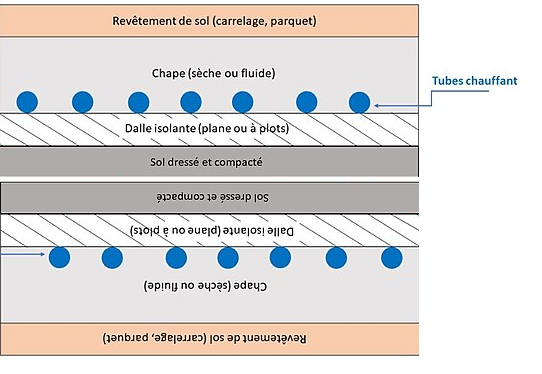Said,
Thank you for the additional clarification; the layers are not mirrored by TRNBuild/Type56. Define the construction using the wall manager and then make sure that the front/back is set in one of the two zones.
kind regards,
David
Dear David;The picture that I included it is what I'm concerned might be happening.in fact the building has two parts. the first one is for adjacent area and other it is intended for a ground floor. at the moment I work adjacent area.Thank you for the precious advice.
Best.Said LAMGHARI
De : David BRADLEY <d.bradley@tess-inc.com>
Envoyé : jeudi 2 juin 2022 20:15
À : Said LAMGHARI <said.lamghari@edu.uca.ma>; TRNSYS users mailing list at OneBuilding.org <trnsys-users@lists.onebuilding.org>
Objet : Re: [TRNSYS-users] Underfloor heatingSaid,
I am not sure I understand whether you are trying to create a construction that has 2 layers of heating tubes or whether you are trying to avoid creating such a construction. Can you please clarify whether the picture that you included is what you want to model or if it is what you are concerned might be happening?
In general, an ADJACENT wall (or floor or ceiling) defined in TRNBuild does not have any mirroring in it. You create the layers of the wall however you wish and then you go to one of the two zones to which the wall is adjacent and you set whether that zone contains the front or the back of the wall. So if the construction you create is made up of the layers: sol, dale, tubes, chape, parquet and you define that construction to be ADJACENT (between two zones) then one of the zones will have the "sol" face and the other zone will have the "parquet" face in it.
If, on the other hand, you want to have a construction that has two active layers in it you'll need to define something called a "direct contact" zone in between them. This is a kind of very low volume virtual airnode that sits between two BOUNDARY constructions. Defining one can be confusing so if the picture below represents what you want, please let me know and I'll try to explain how to do it.
Two side notes:
1. the picture you sent seems like it is intended for a ground floor rather than for an adjacent floor (given the compacted soil layer). If that is indeed the case then you'll want to define the construction as a BOUNDARY rather than as ADJACENT.
2. you're going to need to sandwich the tubing layer between two screed (chape) layers. When you are defining the construction enter the first screed layer as having half of the actual layer's thickness. Next add the active layer and a second screed layer will be added below it. You can move the tubing layer up and down in the screed layer by adjusting the thickensses of the two adjoining layers but you can't put the tubing at the very bottom of the screed layer as it is pictured in your drawing.
kind regards,
David
On 06/01/2022 14:48, Said LAMGHARI wrote:
Dear David;
The creation of a floor or wall is done from the inside to the outside.When I change the construction type of two adjacency room.I notice that it applies to the wall or the ceiling of the other room. I noticed that it is the mirror effect on the adjacency walls.The attached figure shows my idea that I have on the floor study. please confirm this to me, if I m right or not.
Best.
Said LAMGHARI
De : David BRADLEY <d.bradley@tess-inc.com>
Envoyé : mercredi 1 juin 2022 15:23
À : TRNSYS users mailing list at OneBuilding.org <trnsys-users@lists.onebuilding.org>
Cc : Said LAMGHARI <said.lamghari@edu.uca.ma>
Objet : Re: [TRNSYS-users] Underfloor heatingSaid,
Trnsys tries to mimic what would happen in a real world situation; if you put an active layer into a floor that is also the ceiling of another zone and put hot water through it then the floor/ceiling will heat both the zone above and the zone below. To prevent that from happening, you can put insulation on the side that you do not want to be heated.
kind regards,
David
On 06/01/2022 04:35, Said LAMGHARI via TRNSYS-users wrote:
Dear All,I have a question about underfloor heating.Between the floor and the ceiling of two adjacent rooms (ADJ_ceiling) . Do you have any idea about underfloor heating. since we will have the mirror effect on this floor so we will have two active layers..! or not!Best,Said LAMGHARI
_______________________________________________ TRNSYS-users mailing list TRNSYS-users@lists.onebuilding.org http://lists.onebuilding.org/listinfo.cgi/trnsys-users-onebuilding.org-- *************************** David BRADLEY Principal Thermal Energy System Specialists, LLC 3 North Pinckney Street - suite 202 Madison, WI 53703 USA P:+1.608.274.2577 d.bradley@tess-inc.com http://www.tess-inc.com http://www.trnsys.com-- *************************** David BRADLEY Principal Thermal Energy System Specialists, LLC 3 North Pinckney Street - suite 202 Madison, WI 53703 USA P:+1.608.274.2577 d.bradley@tess-inc.com http://www.tess-inc.com http://www.trnsys.com
-- *************************** David BRADLEY Principal Thermal Energy System Specialists, LLC 3 North Pinckney Street - suite 202 Madison, WI 53703 USA P:+1.608.274.2577 d.bradley@tess-inc.com http://www.tess-inc.com http://www.trnsys.com
